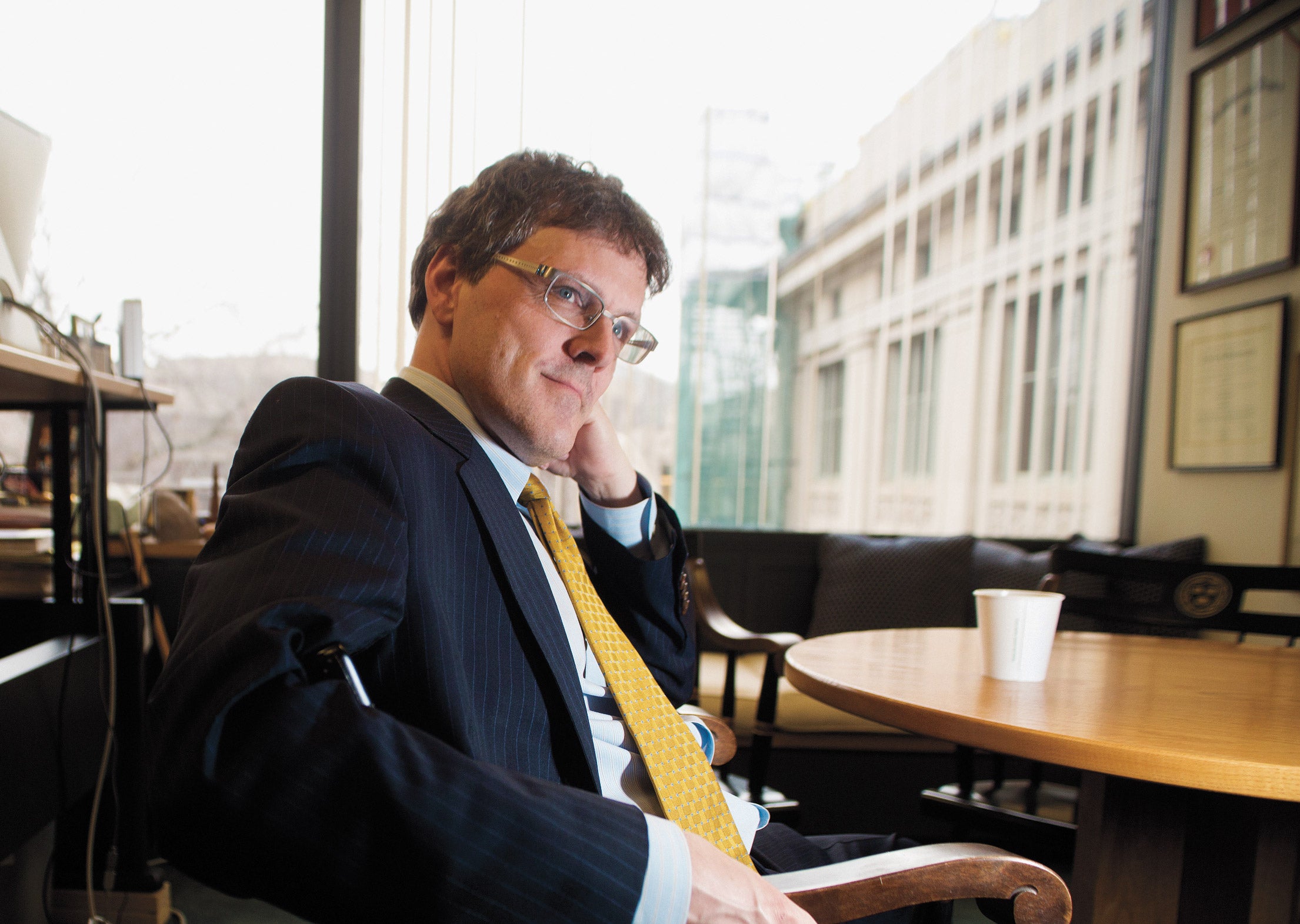The First Amendment protects the political speech of corporations, the U.S. Supreme Court decided in Citizens United. Critics say the ruling corrupts our democracy by allowing billions in corporate money to flood American elections, drowning out the voices of those without the wealth needed to compete for the attention of elected representatives.
Harvard Law Professor John Coates has other concerns about the ruling. He says that the misguided extension of First Amendment rights to corporations—what he calls “the corporate takeover of the First Amendment”—has dire consequences not only for American democracy, but also for American capitalism.

In his new paper, “Corporate Speech and the First Amendment: History, Data, and Implications” (forthcoming in a special issue of the journal Constitutional Commentary), Coates argues that corporations are increasingly using the First Amendment to attack laws and regulations intended to rein in harmful corporate activity (think consumer and environmental protection laws), and that the federal courts are, alarmingly, obliging them.
Coates, an expert in M&As and securities regulation, says there has been “a corporate takeover of the First Amendment.”
His paper contributes to the scholarly literature on the subject in two ways: by examining the rise of First Amendment litigation by corporations, through empirical data, and by reconceptualizing the trend in economic terms—namely, “rent seeking,” the redistribution of benefits at another’s expense without added social value.
A corporate law professor and former partner at Wachtell, Lipton, Rosen & Katz, Coates first found himself drawn to constitutional law after Citizens United was decided in 2010. He acknowledges that crossing this boundary is unusual. Few corporate scholars know constitutional law, he has found, and few constitutional scholars know corporate law.
One of the exceptions is at the center of his article: the late U.S. Supreme Court Justice Lewis Powell LL.M. ’32. Coates sets the stage for Powell’s entrance against the backdrop of history. Until the 20th century, he shows, British and American law assumed that corporations were government creations and subject to routine and widespread government regulation. The Founders never contemplated that corporations had rights similar to those of people—something that Coates argues should be of interest to constitutional originalists. Moreover, Coates writes, the U.S. economy historically grew into a powerhouse without a boost to business via the First Amendment.
The Founders never contemplated that corporations had rights similar to those of people.
That all changed radically in the 20th century, after Powell joined the Court. Months before his elevation on Jan. 7, 1972, and unknown to the U.S. Senate that confirmed him, Powell, a corporate lawyer, wrote a 34-page manifesto to the U.S. Chamber of Commerce. It claimed that the American economic system was under attack not only from leftists, but from “the college campus, the pulpit, the media, the intellectual and literary journals, the arts and sciences, and from politicians.”
Powell argued that “a primary responsibility of corporate management” is to fight back for the sake of “the free enterprise system, and all that this means for the strength and prosperity of America and the freedom of our people.” Among the strategies he urged was litigation. “Other organizations,” he noted, “have been far more astute in exploiting judicial action than American business.
Coates, in a striking graph, quantifies Powell’s judicial influence. Between 1972 and 1987, the period of Powell’s tenure on the Court, free speech cases involving businesses doubled, jumping from 20 percent of the Court’s First Amendment docket to more than 40 percent.
The Court first ruled that commercial speech is protected under the First Amendment in Virginia Pharmacy in 1976. After that, Coates found, nonexpressive businesses (businesses that are not, for example, publishers or film or television companies) went from about a 20 percent win rate in First Amendment cases to a 55 percent win rate—about equal to the win rate for individuals.
In Bellotti (1978), the Court established the right of corporations to free expression, and then came Central Hudson in 1980. There, the Court articulated the test for deciding commercial speech cases: If a case involves commercial speech, and that speech concerns lawful activity and is not misleading, then, to be constitutional under the First Amendment, the law regulating that speech must directly serve a substantial government interest, and it must “fit”—that is, it must restrict no more speech than is “necessary.”
Coates writes that Central Hudson “provided an open invitation to courts to strike down laws ‘abridging’ speech by businesses, even if the laws serve concededly ‘substantial’ and legitimate purposes, even if the interests are served in a straightforward and intuitive fashion, and even if the speech in question has no political or ideological content.”
Case in point: POM Wonderful, LLC, decided in January 2015 by the D.C. Circuit Court of Appeals. The company wanted to market its pomegranate juice with unqualified health claims, based on findings from one randomly controlled study. A Federal Trade Commission order said that companies needed at least two studies; otherwise, they had to state that their claims were based on “preliminary” or “initial” research. The court scrapped that part of the FTC order, ruling that it violated the Central Hudson “fit” requirement.
Coates links the explosion of corporate First Amendment Supreme Court litigation to the influence of Justice Lewis Powell.
Within this doctrinal state of affairs—and here is where rent seeking enters the picture—laws regulating corporations that are passed by legislatures and implemented by agencies with input from broad constituencies, including corporations, are being contested in court by corporate managers with narrow interests and goals. Those laws are being declared unconstitutional by judges who misapply to the corporate form the rights of individuals. The courts in these cases, Coates says, are abusing their powers of judicial review.
And when the federal courts invoke the First Amendment to strike down laws that regulate corporations, argues Coates, they are redistributing the power to regulate corporations from elected officials and regulators (and, by extension, ordinary people) to themselves for the benefit of corporate bureaucrats who are litigating not for increased productivity, but merely for increased profits.
Coates warns: “If our companies are increasingly convinced that the best way they can maximize profit is to focus on legal or political moves, and they stop focusing on productivity and value for consumers as a way of making money, then we are going to end up dragging down both our democracy and our economy.”
